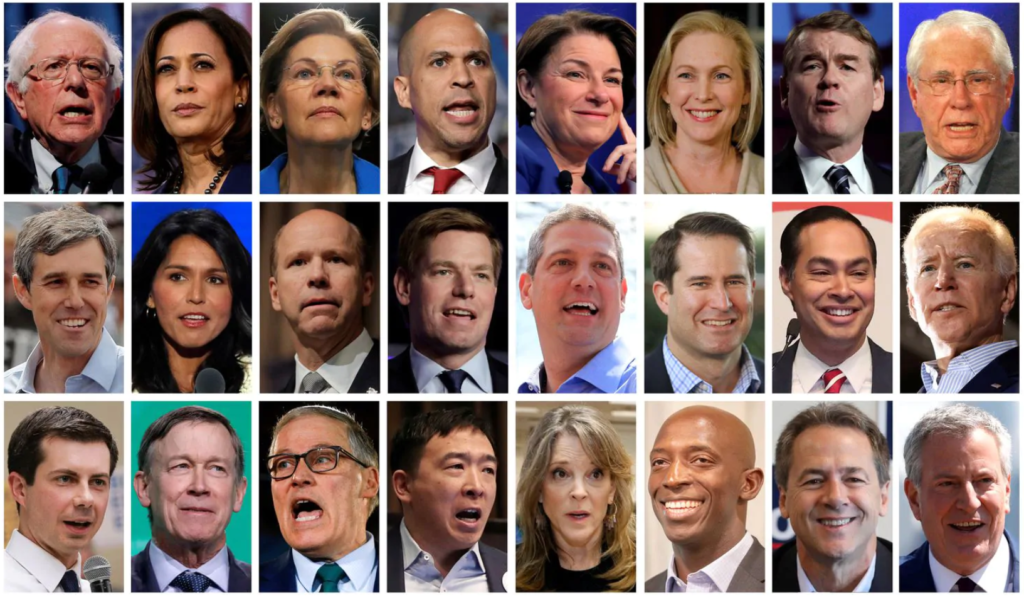For the last two nights, Democrats debated on a national stage in a crowded, competitive primary that will ultimately produce a challenger to President Donald Trump, with the election just 15 months away.
Never before has the U.S. Presidency been infused with more power, guiding the work of millions of federal employees (including the most powerful military in the world), possessing expansive rule-making authority for an array of executive agencies, overseeing agencies that enforce federal laws, and shaping the composition of the federal courts. And that’s to say nothing of the power of the pulpit, with the President able to drive daily messaging through the conventional media and also through social media channels.
While animal protection has not been a topic for discussion in any major debate yet, it’s a subject that’s of concern for tens of millions of Americans. It should occupy a place in the presidential contest that plays out over the next 15 months. Pet care is a $75 billion industry while expenditures on wildlife watching are even more substantial. Opposition to animal cruelty is codified in every state, and a felony when the conduct is most pernicious. There are dozens of federal laws to protect animals – from the Endangered Species Act to the Marine Mammal Protection Act to the Animal Welfare Act. There has been slogging progress on fortifying the legal framework against cruelty, with the 2018 Farm bill including a series of important amendments – to ban animal fighting in the U.S. territories, outlaw the domestic trade in dog and cat meat, and strengthen legal protections for women, children, and pets in settings where domestic violence flares.
Enforcing laws is as crucial as enacting them. The U.S. Department of Agriculture has an Animal Care program organized to drive compliance of Animal Welfare Act standards. The U.S. Department of Justice’s Environment and Natural Resources Division (ENRD) has the responsibility to prosecute animal welfare and conservation crimes. The U.S. Fish and Wildlife Service has a law enforcement division to protect wildlife from illegal conduct. Yet in all of these domains, the enforcement apparatus is underfunded and there’s often a lack of resolve to enforce crimes related to animals when there are so many other urgent safety issues in society.
The challenges are ever greater now, given that the contemporary animal advocacy movement has expanded its gaze to include institutionalized cruelty and broadened its focus to include all animals. Technologies and expanding markets of the twentieth century enabled a new scale and intensity of animal exploitation: the mass confinement of farm animals, global trafficking in wildlife and wildlife products, the use of animals in laboratory tests for risk assessment, industrial whaling, the production of fur, and other practices more ruthless than rational. Today, driven in part by our emerging value systems about animals, technology is starting to become a force for good in the treatment of animals, replacing the machinery of cruelty with alternative methods and products. This shift will remove any plausible reason to resist reform for the good of animals and business.
The United States ended the use of chimpanzees in invasive experiments in 2015. That same year, Ringling Bros., with a brand built over nearly a century and a half, shuttered its operations after it was unable to move past its use of wild animals in traveling acts, while SeaWorld stayed afloat but stopped its breeding of orcas. California and Massachusetts have passed pathbreaking ballot initiatives to stop mass confinement of animals on factory farms. Florida voters banned greyhound racing, shuttering two-thirds of the nation’s tracks in a single lawmaking action. Beyond Meat, a 10-year-old start-up, had one of the biggest run-ups in value of any company in the last quarter century after its Initial Public Offering. In 2019, even Tyson Foods introduced a plant-based burger and a separate offering that blends meat and plants.
There is a rising tide of consciousness about animals and their intelligence and social lives. Animals occupy an ever more prominent place in our lives, whether it’s animals in the home, our tourism built around wildlife watching and nature appreciation, or in our awareness of how our daily consumption practices and other behaviors are tied to the treatment of animals in supply chains often stretch thousands of miles.
A concern about climate change – which affects the lives of humans and non-humans, and will only intensify if present trends continue – has occupied a prominent place in the presidential debates, and rightly so. We’re calling on candidates to build on that forecasting and problem-solving by committing to policies that stem cruelty, strengthen our communities, and protect people and our environment. Congress and the President should declare animals as “sentient beings” and fortify the legal framework against cruelty to domesticated and wild animals and aggressively enforce those laws. They should also be catalysts, rather than impediments, to spur industry-wide, humane-minded transitions in agriculture, fashion, wildlife management, and other sectors of the economy. Every industry with exposure to animals can embrace alternate technologies and strategies that honor the bottom line but reduce or eliminate animal misery and pain in the process.
In the next few weeks, Animal Wellness Action will release a platform of ideas for presidential candidates to embrace, publishing information on the records of the candidates in their prior public service, and asking them to articulate their positions on the issues. But they’ll only speak out on the issues if constituents ask them. We’ll provide you with contact information for the campaigns to help facilitate those communications.
Our nation should never tolerate cruelty, even if it’s conducted by big industries. All animals deserve humane treatment. We must embrace alternatives to animal exploitation as available. Combating cruelty and punishing perpetrators reduces violence and builds a civil society.
